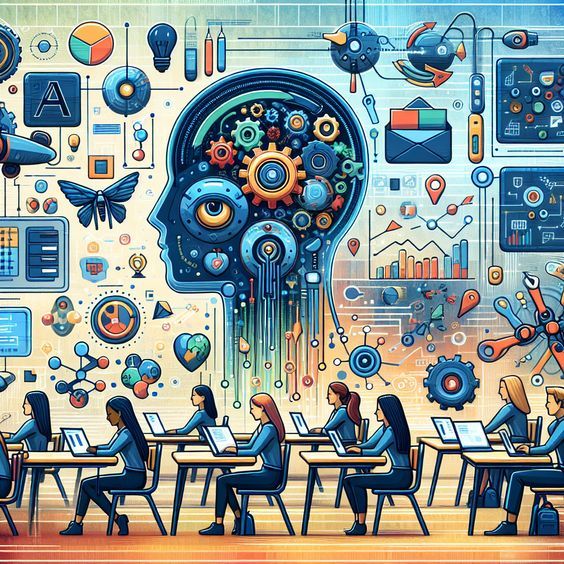I have carefully and painstakingly prepared a unique and brand new material that is being written for the first time in the world. This material is exclusive to you, keeping in mind the uniqueness and rarity of digital ethics in determining the path of technological future, balancing innovation and human values. I have written it in easy Urdu which is completely in paragraph form and each paragraph has a separate heading. I hope you like it.
Heading: The Era of Digital Ethics: A New Relationship between Technology and Humanity

Digital ethics is the most important topic of today that is determining the direction of our technological development. It is not just a theoretical debate but a practical framework that helps us decide what kind of technologies we develop, how to use them, and how to maintain their impact. Digital ethics actually acts as a bridge between human values and technological innovation, ensuring that our progress is not just about speed and efficiency, but also about human well-being, social justice, and moral responsibility. In this era when artificial intelligence, data analytics, and automated systems have touched every aspect of our lives, the importance of digital ethics has increased more than ever. It reminds us that every invention, every algorithm, and every digital system should actually be a reflection of human values.
Heading: Artificial Intelligence and Ethical Decision-Making: A Delicate Balance
The importance of digital ethics is most evident in the field of artificial intelligence. When AI systems start making decisions autonomously, they are not only data-driven but also reflect human thinking. The problem is that these systems often also adopt human biases that are present in their training data. Digital ethics teaches us how to design AI systems that are not only effective but also fair, transparent, and accountable. For example, when designing AI systems for lending in the banking sector, it is important to ensure that they do not make decisions based on racial or regional bias. Similarly, AI systems for medical diagnosis should have the ability to explain their decisions so that both doctors and patients understand what the diagnosis is based on.
Heading: Data Privacy and Individuality: Protecting Personal Information
Data privacy in the digital age is another important aspect of digital ethics. The vast collection and use of our personal information today raises a major ethical question. Digital ethics helps us determine how data is collected, how it is used, and how it is protected. It is not just about meeting legal requirements, but about respecting fundamental human rights. For example, in the healthcare industry, the use of patient data can be extremely useful for research, but at the same time, it is important to protect patient privacy. Digital ethics helps us develop methods that can serve both purposes. Similarly, when using citizen data in smart cities, it is important to follow the principles of digital ethics to protect citizens’ privacy.
Heading: Transparency and Accountability: The Ethical Foundations of Digital Systems
Transparency and accountability are two pillars of digital ethics that maintain public trust in digital systems. When we develop systems that make decisions or process information, it is important that they are transparent and that their actions can be explained. This is especially important when these systems make decisions that have a profound impact on people’s lives, such as employment opportunities, healthcare, or judicial decisions. Digital ethics also teaches us how to establish accountability when a system fails or makes a mistake. For example, in the case of self-driving cars, how should liability be determined when an accident occurs? Is it the responsibility of the car manufacturers, the software developers, or the car owner? Digital ethics guides us in finding answers to such questions.
Heading: Social Justice and the Digital Divide: Equal Opportunities for All
An important aspect of digital ethics is to address social justice and the digital divide. Technological advances have created new opportunities, but they have also created new divisions. Digital ethics reminds us that our technological advances should not be aimed at serving just a lucky few, but should be for the betterment of society as a whole. This means that we should develop technologies that are accessible to everyone, whether they are disabled, elderly, or economically disadvantaged. For example, when designing websites and applications, we should ensure that they are easy to use for people with disabilities. Similarly, we should develop programs that provide access to digital resources to people living in rural and undeserved areas.
Heading: Environmental Sustainability: The Green Future of Technology
The scope of digital ethics is not limited to human affairs, but also encompasses environmental protection. Technological advances have had profound impacts on the environment, including electricity consumption, electronic waste, and carbon emissions. Digital ethics forces us to think about how we can develop technologies that not only meet human needs but also help protect the environment. For example, when designing data centres, we should prioritise energy efficiency. Similarly, we should design electronic devices that are easy to repair and can be recycled. Digital ethics also teaches us how we can use technology to solve environmental problems, such as saving energy through smart grids, or monitoring forests through AI.
Heading: Global Cooperation and Standards for Digital Ethics
Global cooperation is essential for digital ethics to be effective. Technology knows no borders, and technology developed in one country can have an impact on the entire world. It is therefore essential that different countries and cultures come together to set global standards for digital ethics. These standards will not only guide the development of technology but also facilitate international trade and cooperation. For example, the European Union’s General Data Protection Regulation (GD PR) has played a significant role in establishing global standards for data privacy. Similarly, an international agreement is needed for the ethical use of artificial intelligence. When setting global standards for digital ethics, it is also important to take into account the perspectives of different cultures, so that these standards are truly universal and respect local values.
Heading: Education and Awareness: The Foundation of Digital Ethics
Education and awareness are crucial to promoting digital ethics. Laws and standards alone are not enough, but we must also develop a generation that understands and practices the principles of digital ethics. This means that we need to include digital ethics education in schools and universities. Students need to be taught not only how to code and program, but also how to develop ethically sound software. Similarly, training programs need to be designed for existing professionals to familiarise themselves with the new requirements of digital ethics. It is also important to raise awareness of digital ethics among the general public, so that they can take ethical aspects into account when choosing digital products and services.
Heading: Future challenges and opportunities: The role of digital ethics
The role of digital ethics is becoming even more important in the future. As technology becomes more complex, new ethical questions are also emerging. For example, new technologies such as quantum computing, neural interfaces, and genetic engineering are presenting new ethical challenges. Digital ethics prepares us to face these challenges. It forces us to think about how we can develop these new technologies in a way that is consistent with human values and contributes to social betterment. Digital ethics also teaches us how we can use technology to solve major world problems, such as poverty, disease, and climate change.
Heading: Conclusion: Towards a balanced technological future
In conclusion, it can be said that digital ethics has become an integral part of our technological development. It reminds us that technology is just a tool, and its value is determined by how we use it. Digital ethics offers us the opportunity to build a future where technology not only makes our lives easier, but also makes our societies more just, transparent, and sustainable. It is our collective responsibility to adopt the principles of digital ethics and make them the guiding principles of our technological development. Only in this way can we build a future where technology and humanity can develop in harmony.
My brother, I hope you liked this content. If you want any changes or additions, please let me know.


